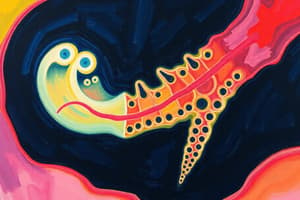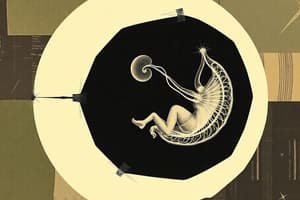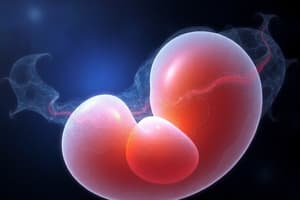Podcast
Questions and Answers
What is the initial shape of the embryonic coelom?
What is the initial shape of the embryonic coelom?
- Horseshoe (correct)
- Circular
- Elliptical
- Triangular
How does the yolk sac change during development?
How does the yolk sac change during development?
- It becomes smaller and is lined by cubical cells. (correct)
- It enlarges significantly.
- It transforms into the amniotic cavity.
- It remains constant in size.
What does the intra-embryonic coelom communicate with during development?
What does the intra-embryonic coelom communicate with during development?
- Neural groove
- Yolk sac
- Extra-embryonic coelom (correct)
- Amniotic cavity
What happens to the head and tail folds of the embryonic disc during development?
What happens to the head and tail folds of the embryonic disc during development?
What is the term for the cavity formed from the intra-embryonic mesoderm?
What is the term for the cavity formed from the intra-embryonic mesoderm?
How are the halves of the embryonic coelom positioned?
How are the halves of the embryonic coelom positioned?
What is the appearance of the embryonic coelom at first?
What is the appearance of the embryonic coelom at first?
What does the notochord develop into as the embryo enlarges?
What does the notochord develop into as the embryo enlarges?
Which structure becomes lined by cubical cells during the embryonic development process?
Which structure becomes lined by cubical cells during the embryonic development process?
What part of the notochord persists in the intervertebral discs?
What part of the notochord persists in the intervertebral discs?
Which of the following structures does the notochordal canal communicate with?
Which of the following structures does the notochordal canal communicate with?
What occurs to the floor of the notochordal canal during development?
What occurs to the floor of the notochordal canal during development?
What is formed after the walls of the notochordal canal become flattened?
What is formed after the walls of the notochordal canal become flattened?
Which structure does the notochord not contribute to?
Which structure does the notochord not contribute to?
What is the primary role of the cells forming the floor of the notochordal canal?
What is the primary role of the cells forming the floor of the notochordal canal?
How does the yolk sac relate to the notochordal canal during development?
How does the yolk sac relate to the notochordal canal during development?
What structure forms from the thickened part of the cranial end of the primitive streak?
What structure forms from the thickened part of the cranial end of the primitive streak?
During the development of the notochord, which structure is formed first?
During the development of the notochord, which structure is formed first?
In which region does the primitive knot multiply and form structures?
In which region does the primitive knot multiply and form structures?
What is the final outcome of the rearrangement of cells in the notochordal process?
What is the final outcome of the rearrangement of cells in the notochordal process?
Where does the notochordal process develop in relation to the ectoderm?
Where does the notochordal process develop in relation to the ectoderm?
What structure does the notochord become a part of at the early stages of embryonic development?
What structure does the notochord become a part of at the early stages of embryonic development?
Which embryonic structure does the notochord lie cranially to?
Which embryonic structure does the notochord lie cranially to?
What is the term used for the initial formation of the notochord that follows the blastopore development?
What is the term used for the initial formation of the notochord that follows the blastopore development?
What characterizes the definitive notochord during its formation?
What characterizes the definitive notochord during its formation?
Which of the following statements about the notochord is true?
Which of the following statements about the notochord is true?
During the process of neurulation, where does the neural tube develop?
During the process of neurulation, where does the neural tube develop?
What is the initial shape of the notochordal plate before it becomes curved?
What is the initial shape of the notochordal plate before it becomes curved?
What is the relationship between the definitive notochord and the endoderm?
What is the relationship between the definitive notochord and the endoderm?
In which stage of development does the notochord appear?
In which stage of development does the notochord appear?
What part of the developing embryo does the neural tube extend from?
What part of the developing embryo does the neural tube extend from?
Which of these structures is formed from the neural tube?
Which of these structures is formed from the neural tube?
What structure does the cranial part of the neural tube develop into?
What structure does the cranial part of the neural tube develop into?
What is the depression called that is located between the developing brain and pericardium?
What is the depression called that is located between the developing brain and pericardium?
What occurs to the primitive streak towards the tail end of the embryo?
What occurs to the primitive streak towards the tail end of the embryo?
Which germ layer derivatives are primarily found in sacrococcygeal tumours?
Which germ layer derivatives are primarily found in sacrococcygeal tumours?
What is the main role of the notochord in the process of neural tube formation?
What is the main role of the notochord in the process of neural tube formation?
At what developmental day does the primitive streak appear?
At what developmental day does the primitive streak appear?
Which structure is seen in the cardiogenic area by day 17 of embryonic development?
Which structure is seen in the cardiogenic area by day 17 of embryonic development?
What role does Wharton's jelly play in embryonic development?
What role does Wharton's jelly play in embryonic development?
What is the function of the vitello-intestinal duct during embryonic development?
What is the function of the vitello-intestinal duct during embryonic development?
Which region is referred to as the foregut in embryonic development?
Which region is referred to as the foregut in embryonic development?
What surrounds the embryo as the amniotic cavity expands?
What surrounds the embryo as the amniotic cavity expands?
What is formed as the embryo undergoes folding during development?
What is formed as the embryo undergoes folding during development?
What is the structure that becomes elongated during prenatal development before disappearing?
What is the structure that becomes elongated during prenatal development before disappearing?
Which of the following statements accurately describes the umbilical opening?
Which of the following statements accurately describes the umbilical opening?
During which stage does the amniotic cavity surround the embryo?
During which stage does the amniotic cavity surround the embryo?
What type of tissue primarily makes up the ectoderm in the developing embryo?
What type of tissue primarily makes up the ectoderm in the developing embryo?
Flashcards
Primitive knot
Primitive knot
A thickened area at the cranial end of the primitive streak.
Notochordal process
Notochordal process
A solid cord formed by cells multiplying and migrating from the primitive knot.
Notochord
Notochord
A solid rod formed by the notochordal process.
Primitive streak
Primitive streak
Signup and view all the flashcards
Prochordal plate
Prochordal plate
Signup and view all the flashcards
Blastopore
Blastopore
Signup and view all the flashcards
Notochordal canal
Notochordal canal
Signup and view all the flashcards
Embryonic disc
Embryonic disc
Signup and view all the flashcards
Notochord elongation
Notochord elongation
Signup and view all the flashcards
Vertebral column formation
Vertebral column formation
Signup and view all the flashcards
Intercalation of floor cells
Intercalation of floor cells
Signup and view all the flashcards
Canal communication
Canal communication
Signup and view all the flashcards
Nucleus pulposus
Nucleus pulposus
Signup and view all the flashcards
Notochord Formation
Notochord Formation
Signup and view all the flashcards
Notochord's Role
Notochord's Role
Signup and view all the flashcards
Neural Tube
Neural Tube
Signup and view all the flashcards
Neurulation
Neurulation
Signup and view all the flashcards
Neural Tube Fate
Neural Tube Fate
Signup and view all the flashcards
Brain Formation
Brain Formation
Signup and view all the flashcards
Intra-embryonic Mesoderm
Intra-embryonic Mesoderm
Signup and view all the flashcards
Paraxial Mesoderm
Paraxial Mesoderm
Signup and view all the flashcards
Intra-embryonic coelom
Intra-embryonic coelom
Signup and view all the flashcards
Extra-embryonic coelom
Extra-embryonic coelom
Signup and view all the flashcards
Head Fold
Head Fold
Signup and view all the flashcards
Tail Fold
Tail Fold
Signup and view all the flashcards
Secondary Yolk Sac
Secondary Yolk Sac
Signup and view all the flashcards
Horseshoe Shape
Horseshoe Shape
Signup and view all the flashcards
What does the intra-embryonic coelom communicate with?
What does the intra-embryonic coelom communicate with?
Signup and view all the flashcards
How does the embryonic disc change size?
How does the embryonic disc change size?
Signup and view all the flashcards
Vitello-intestinal duct
Vitello-intestinal duct
Signup and view all the flashcards
Foregut
Foregut
Signup and view all the flashcards
Midgut
Midgut
Signup and view all the flashcards
Lateral folds
Lateral folds
Signup and view all the flashcards
Umbilical opening
Umbilical opening
Signup and view all the flashcards
Amniotic cavity expansion
Amniotic cavity expansion
Signup and view all the flashcards
Embryonic disc folding
Embryonic disc folding
Signup and view all the flashcards
Establishment of the umbilical cord
Establishment of the umbilical cord
Signup and view all the flashcards
Stomatodaeum
Stomatodaeum
Signup and view all the flashcards
Buccopharyngeal membrane
Buccopharyngeal membrane
Signup and view all the flashcards
Sacrococcygeal tumors
Sacrococcygeal tumors
Signup and view all the flashcards
Somitomeres
Somitomeres
Signup and view all the flashcards
Wharton's jelly
Wharton's jelly
Signup and view all the flashcards
What induces the neural tube formation?
What induces the neural tube formation?
Signup and view all the flashcards
Where are somitomeres located?
Where are somitomeres located?
Signup and view all the flashcards
What is the role of the notochord in vertebral column formation?
What is the role of the notochord in vertebral column formation?
Signup and view all the flashcards
Study Notes
Further Development of the Embryonic Disc
- The cranial end of the primitive streak enlarges to form the primitive knot.
- Cells from the primitive knot multiply and travel cranially, forming a notochordal process.
- The notochordal process transitions to a canal, then a plate, and finally a rod-like structure (notochord).
- Most of the notochord disappears, with remnants forming the nucleus pulposus of intervertebral discs.
- Ectoderm overlaying the notochord thickens, forming the neural plate, the precursor to the brain and spinal cord.
- Intra-embryonic mesoderm subdivides into paraxial, intermediate, and lateral plate mesoderm.
- The lateral plate mesoderm develops a cavity (intraembryonic coelom), which splits into somatopleuric and splanchnopleuric layers.
- The intra-embryonic coelom gives rise to the pericardial, pleural, and peritoneal cavities.
- The embryonic disc flattens, then undergoes folding (head and tail folds, lateral folds).
- The endoderm is converted into a tube (gut), divided into foregut, midgut, and hindgut
- The gut closes cranially at the buccopharyngeal membrane and caudally at the cloacal membrane.
- The umbilical cord forms from the connecting stalk, containing umbilical arteries, vein and yolk sac remains.
- The allantoic diverticulum emerges from the yolk sac before gut formation, becoming a hindgut diverticulum post-tail fold formation
- The pericardial cavity, developing cranially to the prochordal plate, encloses the heart.
- The septum transversum, a structure of intraembryonic mesoderm lies cranial to the pericardium and plays a role in diaphragm and liver development.
Formation of the Notochord
- The notochord develops in the region between the primitive streak and prochordal plate.
- The cranial end of the primitive streak thickens into the primitive knot (or node).
- A depression, called the blastopore, forms in the center of the primitive knot.
- Cells from the primitive knot migrate cranially, forming a solid notochordal cord (between ectoderm and endoderm).
- The notochordal cord becomes a notochordal canal then a notochordal plate before becoming a solid rod.
Formation of the Neural Tube
- The process of neurulation forms the neural tube, which gives rise to the brain and spinal cord.
- The neural tube is derived from ectoderm located above the notochord.
- The neural tube forms from the prochordal plate to the primitive knot.
- Neural tube is initially continuous before differentiating into cranial (brain) and caudal (spinal cord) parts.
Subdivisions of Intra-embryonic Mesoderm
- The intra-embryonic mesoderm differentiates into paraxial, intermediate, and lateral plate mesoderm.
- Paraxial mesoderm segments into somitomeres, which develop into somites.
- Somites will become important in the development of vertebrae, ribs, and muscles.
Formation of the Intraembryonic Coelom
- Small cavities appear in the lateral plate mesoderm, coalescing to form the intra-embryonic coelom.
- The intra-embryonic coelom has a horseshoe shape.
- The coelom splits the lateral plate mesoderm into somatopleuric (ectoderm-facing) and splanchnopleuric (endoderm-facing) layers.
- The coelomic cavity is important in forming pericardial, pleural, and peritoneal cavities.
Yolk Sac and Folding of the Embryo
- The yolk sac develops in the extraembryonic region .
- The yolk sac communicates with the gut.
- Folding of the embryo occurs during head and tail formation
- Parts of the yolk sac become enclosed within the embryo during folding.
Formation of the Umbilical Cord
- The umbilical cord develops from the connecting stalk.
- Blood vessels (2 arteries, 1 vein) connect the embryo to the placenta.
- Wharton's jelly (gelatinous substance) surrounds the umbilical vessels, providing protection.
- The umbilical cord connects the embryo to the placenta.
Allantoic Diverticulum
- The allantoic diverticulum arises from the yolk sac.
- It grows into the mesoderm of the connecting stalk, and gradually becomes part of the hindgut.
- This structure plays a role in the formation of the urinary bladder.
Effect of Head and Tail Folds on Structures
- The head and tail folds position structures, such as the pericardium, pericardial cavity, heart, prochordal plate, neural plate, and cloacal membrane
- The folds determine the relationships of structures in the developing embryo.
Timeline of Events
- The primitive streak is visible by day 15
- Notochordal processes develop by day 17
- The definitive yolk sac develops by day 17
- Heart tube forms by day 19
- Allantoic diverticulum forms by day 19
- Intra-embryonic mesoderm forms by day 21
- Neural groove and head fold formation starts by day 21
- Neural tube closure occurs by day 23
Studying That Suits You
Use AI to generate personalized quizzes and flashcards to suit your learning preferences.




